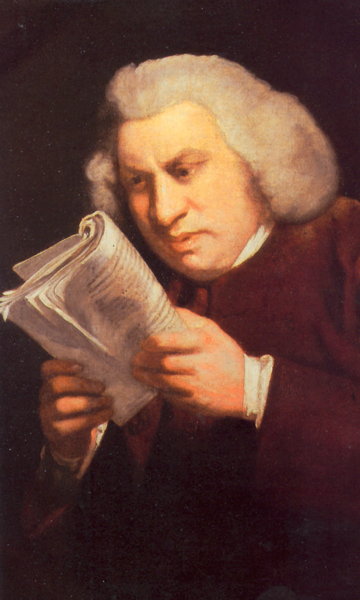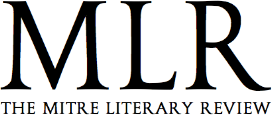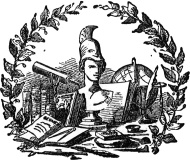The Meaning of ‘Aardvark’
Two-hundred-and-fifty years ago, Johnson published his Dictionary, a work of genius and prejudice
 When the London bookseller Robert Dodsley put the idea of an English dictionary to Samuel Johnson, the great man of letters paused, considered the proposition, and said, ‘I believe I shall not undertake it.’ His response was a wise one. An equivalent project in France had kept busy forty academic hands for forty long years. What was being proposed for England was a work by one man, without a university degree or position, to be completed in three years.
When the London bookseller Robert Dodsley put the idea of an English dictionary to Samuel Johnson, the great man of letters paused, considered the proposition, and said, ‘I believe I shall not undertake it.’ His response was a wise one. An equivalent project in France had kept busy forty academic hands for forty long years. What was being proposed for England was a work by one man, without a university degree or position, to be completed in three years.
There was no comprehensive dictionary in the language, – only one by Nathan Bailey in 1721 which pathetically defined a mouse as ‘an animal well known’, revised after complaint to ‘a small Creature infesting houses’. Something more satisfactory was needed, and the task – proposed previously to Addison and then Pope – fell to Johnson, who in 1755, after nine years, produced a dictionary of 40,000 words, advertising itself ‘etymological, analogical, syntactical, explanatory and critical’. He would define mouse as ‘the smallest of all beasts; a little animal haunting houses and corn fields, destroyed by cats.’ Much better.
Though 40,000 words is a fraction of the OED and indeed even less than Bailey’s earlier dictionary, Johnson’s word-hoard was far beyond a mere improvement. It was a giant leap in classification, schematically distinguishing between the senses of every word. Being a masterpiece of English prose, with definitions so pithy and correct that many are borrowed still by modern lexicographers (def. ‘a writer of dictionaries; a harmless drudge’), it remained the standard well into the nineteenth century. Only the philology of that century – which showed many of Johnson’s etymologies to have been fanciful – enabled the creation of a dictionary that surpassed it.
The work was a triumph of scholarship, though admittedly with ‘a few wild blunders and risible absurdities’ (corrected in the 2nd edn.). It earned him the nickname ‘Dictionary’ Johnson, and the reputation as England’s foremost man of letters, living outside the universities and surviving on commercial success rather than a fellowship. However, the adulation was not universal. The dictionary did not go down well in Scotland, and a St. Andrews theologian and classicist called Archibald Campbell attacked ‘our English Lexiphanes, the Rambler’, ‘the great corrupter of our taste of language’, and his personal, political, and national dictionary. But this was in its way a tribute, for the Dictionary was a personal work – not the product of an institution, as were the 1612 Vocabolario of the Academia della Crusca, or the 1694 Dictionnaire of the Académie française. Johnson’s Dictionary of 1755 was the work of an individual animus and it shewed forth the man.
The dictionary is famous for its succinct definitions and array of quotation, the latter chosen judiciously to illustrate the former. In search of exemplary usage, Johnson borrowed and defaced his friends’ books, and proclaimed that he had ‘extracted from his philosophers principles of science; from historians remarkable facts; from chemists complete processes; from divines striking exhortations; and from poets beautiful descriptions’. The result was that those authors selected as exemplary became with Johnson ‘authorities’ (the dictionary was an important step in canon-formation), and their example, for good or ill, standardised ‘good’ English usage. This act of codification made English a bit more like Latin and Greek, and a bit less wild and organic.
Johnson was, however, criticised for airing his prejudices in a work of supposed scholarship, as when he famously defined Whig, ‘the name of a faction’, in contrast to Tory, ‘One who adheres to the ancient constitution of the state, and the apostolical hierarchy of the church of England, opposed to a Whig’. An innocuous word like oats became an opportunity to needle the Scots (especially Archibald Campbell), which he took up willingly: ‘oats. A grain which in England is generally given to horses, but in Scotland supports the people.’
Besides such cameos, the dictionary shows the prejudice of its age by ignoring mediæval literature in its quotations. ‘I have fixed Sidney’s work for the boundary beyond which I make few excursions’, wrote Johnson is his Preface. Shakespeare got in, as furnishing ‘the diction of common life’, but Johnson thought the English language was shown in its purity in Hooker, the King James Bible, Bacon, Raleigh, Sidney, and Spenser (all canonical works of early English Protestantism). Johnson’s authorities were post-mediæval but pre-Restoration. Quoting Spenser, he called them ‘the wells of England undefiled, … the sources of genuine diction.’ Pre-sixteenth century texts did admittedly lay largely unedited, in dispersed (if not destroyed) monastic libraries and great private collections, but still his canonical dictionary cut England yet further adrift from its mediæval heritage.
Such a literary approach, basing English usage on great writers, differs from the practice of Johnson’s modern OED successors, but Johnson thought the lexicographer’s role was not to reflect common usage but to ‘correct or proscribe’ where he found linguistic ‘improprieties and absurdities’. As he explains in his fine Preface, he was not seeking to record the language but to improve it.
Curiously, Johnson cited ‘no author whose writings had a tendency to hurt sound religion and morality’, and famously when congratulated by some ladies on excluding all the ‘naughty’ words, replied unsparingly, ‘What, my dears, then you have been looking for them?’ It has been pointed out to me that the ladies either did not find, or did not consider sufficiently naughty, the entries for ‘piss’ and ‘fart’. Consistent with his method of definition followed by illustration, the latter was accompanied by a quotation from Swift:
As when we a gun discharge,
Although the bore be ne’er so large,
Before the flame from muzzle burst,
Just at the breech it flashes first;
So from my lord his passion broke,
He farted first, and then he spoke.
But for many the relative conservativism of the dictionary was not a virtue, and so as a symbol of her rebelliousness Becky Sharpe tosses a copy from her carriage at the beginning of Vanity Fair.
I encourage all to take a brief look at the fine facsimile of the 1755 first edition, in two enormous volumes in the dictionary section of the University Library. The modern reader can certainly still enjoy Johnson’s magnum opus, though some definitions are abstruse, such as, notoriously, ‘Net: Anything reticulated or decussated at equal distances, with interstices between the intersections.’ As his biographer Boswell comments, critics found this guilty of ‘obscuring a thing in itself very plain.’



